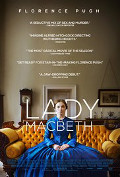
Directed by
William Oldroyd
89 minutes
Rated M
Reviewed by
Bernard Hemingway

Lady Macbeth
Synopsis: In the north of Victorian England. Katherine (Florence Pugh), a stubbornly proud young woman, has been married off to Alexander (Paul Hilton), the morose son of a wealthy, over-bearing mine owner (Christopher Fairbank). She is expected to be a submissive wife and bear heirs for the family name. But Katherine refuses to be broken by these men and begins a disastrous affair with a groundsman (Cosmo Jarvis).
Theatre director William Oldroyd‘s outstanding feature film debut makes for a perfectly antithetical companion piece to veteran director Terence Davies’ just-released Emily Dickinson biopic, A Quiet Passion. So much so that it is almost impossible to think of one without thinking of the other. Both are set in roughly the same time-period - the mid-nineteenth century - and both are about women imprisoned by the social, moral and economic strictures of the time. But whereas Davies’ film is about libidinal energy turned in on itself and sublimated, Oldroyd‘s is about that same energy physicaly expressed. Indeed, Lady Macbeth is just the sort of Gothic romance that, one feels, Dickinson would have relished in imagination.
The films are thematically two sides of the same coin and reflecting that difference their directors have taken very different approaches to putting them on screen. Both films are marked by the extraordinary clarity of their imagery and the fastidiousness of their production and costume design and art direction (to name only the top level of skilled artisanship) but whereas there is the whiff of lavender sachets about A Quiet Passion’s comfortably-appointed settings, Lady Macbeth is marked by the Calvinistic sparseness of its chill manor house interiors and the gloom of the surrounding forest.
Qualitatively speaking, the two films run neck-a-neck but Oldroyd‘s decision to strip the production down to its essentials has far more effective results than Davies’ relatively cluttered story and mannered dialogue. Indeed Oldroyd’s film does what is so often said that film should do, and that is, tell its story visually. There is no back-story that explains Katherine’s present position or broader narrative context for the events. The absolutely necessary details are given in the occasional line of the minimal dialogue as Oldroyd concentrates on simply showing us those events as they proceed with a brutal inevitability to their bitter conclusion. All this is done with such precision that it is quite sufficient for our full appreciation of social and psycho-sexual implications involved. By this means, whereas Davies went to so much trouble to seal his protagonists in a moment in time and so removed them from us, Oldroyd endows his with an elemental intensity that transcends their historical specificity. The effect on us is compelling in a way that Davies’ study of social niceties is not (acknowledging that one is history, the other fiction).
Katherine is in many ways a classic 19th century tragic heroine, like Emma Bovary, the agent of her own destruction. In a quietly powerful performance, Florence Pugh delivers handsomely on her promising 2014 debut in The Falling as the young woman whose insolent pride and natural sexuality wreaks havoc as she silently unleashes the disruptive power of Eros on the withered ways of the patriarchal order that has imprisoned her against her will. The other cast members, including Naomi Ackie as Katherine's intimidated maid in waiting. fit the ensemble well, with Christopher Fairbank particularly good as the nasty paterfamilias.
Don’t be misled by the film’s somewhat misleading title. Other than blood on their hands there is no immediate connection between Katherine and Shakespeare’s infamous character, screenwriter Alice Birch taking over the allusion from Nikolai Leskov’s 1865 novella ‘Lady Macbeth of the Mtsensk District’, which has at its centre a scheming murderess.
FYI: Leskov’s novella was turned into an opera in 1934 by Shostakovich, a work which was denounced by the Communist Party apparently on Stalin’s orders, and filmed by Andrzej Wajda as Siberian Lady Macbeth in 1962.

Want more about this film?


Want something different?




